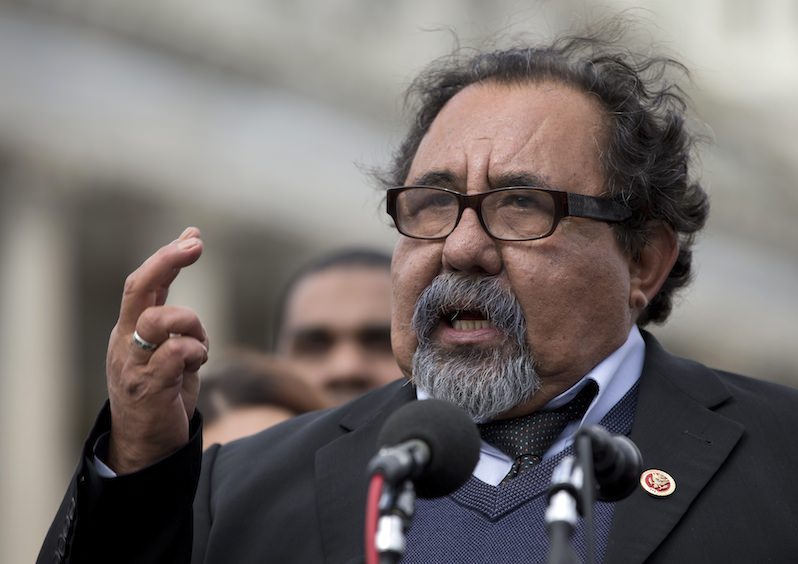Despite the Sad State of American Politics, Rep. Raul Grijalva Is Optimistic—Here’s Why
These days it's easy to be jaded by our political system. So why does Arizona Rep. Raul Grijalva have a positive outlook? Rep. Raul Grijalva gestures as he speaks during a news conference on Capitol Hill in Washington, D.C., in 2013. (AP/Carolyn Kaster, File)
Rep. Raul Grijalva gestures as he speaks during a news conference on Capitol Hill in Washington, D.C., in 2013. (AP/Carolyn Kaster, File)
These days it’s easy to be jaded by our political system. The Supreme Court’s conservative majority has made it easier than ever for the fabulously wealthy to buy democracy with the McCutcheon v. FEC ruling. Income inequality is higher than it has ever been and yet we can’t even get a federal minimum wage increase. Prominent older white men feel comfortable expressing their naked racism while a young white man backed by conservative interests denies the existence of white privilege in an essay that goes viral. A woman is convicted of assaulting an officer after she herself was groped and beaten by police.
It’s enough to depress a progressive.
So why is Arizona Rep. Raul Grijalva so optimistic? In an interview on Uprising, he told me, “We [progressives] are too used to losing. Pretty soon we’re going to have to get used to winning.”
He explained, “We shouldn’t be wringing our hands right now. We’re on the cusp of something very important, where public opinion wants to end wage disparity, where public opinion believes that climate change is real and we have to do something about it, that we need a path to citizenship and immigration reform, that the minimum wage has to be raised and we need to create jobs.” Looking at the big picture, Grijalva was sure that “public opinion feels that our democracy is in a bad place because the rich are running it. These are all public opinions on our [progressive] side of the equation.”
Grijalva is the co-chair, with Minnesota Rep. Keith Ellison, of the Congressional Progressive Caucus. Given the relentless battles being fought by both major parties over budgetary allocations, the CPC decided to give up on the notion that a progressive budget would pass either of the two houses of Congress or even find strong support within the Democratic Party. So instead of attempting to reach a compromise with Republicans, the caucus authored what it calls the Better Off Budget, a document that embodies bread-and-butter progressive values that are also popular among mainstream Americans.
Relative to the extremely low tolerance for compassionate policies on Capitol Hill, the Better Off Budget is a progressive’s dream. It demands comprehensive immigration reform, restores state budgets to rehire laid-off public employees and create public works programs, reduces baseline military spending, closes corporate tax loopholes, ends many corporate subsidies and welfare programs, penalizes polluting companies, increases Social Security benefits and creates a public financing mechanism for elections.
The financial plan stands in stark contrast to one that recently passed the House, authored by tea party darling Congressman Paul Ryan, who chairs the Budget committee.
Grijalva didn’t hold back in his characterization of Ryan’s budgetary vision, saying, “The concentration of wealth in this country, the oligarchy that controls the money and now the democratic process, and the huge role that the private sector and corporate America plays in the future of America are once again anointed by the Ryan budget.”
The CPC, according to Grijalva, decided that in its version of the budget, “we’re going to spend a lot of money up front. We’re going to create 8.8 million jobs, put people to work, deal with wage disparity, deal with equal pay, and tax fairly the people who have made huge economic gains in the last decade and a half in this country.”
The Better Off Budget garnered 90 votes in the House — just over 20 percent — a remarkable achievement considering the Ryan alternative. Grijalva sees budgetary priorities as part of a greater existential question that his party needs to grapple with. “I think the economic question is key to the survival and eventually, to the prominence of the Democratic Party,” he told me. “To continue to run from it and try to work around the nuances of what Ryan’s doing is a mistake.”
To that end, he and other progressives in Congress “decided we’re not going to provide a middle-ground alternative.” The budget makes immigration reform — a matter close to Grijalva’s heart — a strong priority, and links it with a strengthening of the economy. In its official description, the budget calls for “comprehensive immigration reform” and a “pathway to citizenship.” It boldly asserts that “today’s outdated immigration laws have failed workers, families, businesses and, increasingly, our nation’s immigrants. Employers are unable to hire the workers they need. Immigrant workers are exploited. Families trying to reunite legally are separated for many years, and millions of individuals are forced to live in the shadows.” But immigration reform has hit a legislative standstill, with Republicans refusing to budge and the White House continuing its failed policy to remain “tough on enforcement.” As a result, thousands of families have been separated, and President Obama has earned the moniker “Deporter-in-Chief” for deporting more immigrants than any other president in U.S. history.
Grijalva once more finds himself taking a minority position. He explained how “some of us reached the tipping point that we cannot continue to be mute on an issue as fundamental as this. We wrote a letter to the president — 37 of us — saying you’ve got to stop these deportations, you got to use your executive power and your constitutional authority to provide relief, to quit separating families and to end this crisis.” Taking such positions comes with a price, and the Arizona congressman revealed to me, “We received a lot of flak for this. As though we were somehow sabotaging the ability to have immigration reform.” But he remained firm, saying, “The Republicans deserve a great deal of blame, but there’s also a great deal of responsibility at the White House.”
If taking a stand on issues because the public demands it is the essence of democracy, then Grijalva seems to be on the right track — at least on immigration. The uptick in immigrant rights activism, from hunger strikes to civil disobedience at the border, has sharply raised the stakes over the past year. Grijalva acknowledged, “I’m not leading this parade, I’m joining it, because the activist community and the young people shifted to begin to talk about immediate relief on the issue of deportation.”
The son of a migrant farmworker from Mexico, Grijalva realizes that at the heart of the debate on immigration is race. “Implicit in what we’re hearing and the resistance that you get to something fair and compassionate being done to reform immigration law is the issue of race,” he told me. “The issue of ‘us versus them’ and the issue of ‘they’re not us.’ ” That is an analysis rarely heard in the halls of Congress.
So how does someone like Grijalva survive in an atmosphere increasingly ruled by conservative and moneyed interests? He survives because, in his own words, “the force of community can push our agenda.” Grijalva told me he eventually realized “that my politics were not going to prevail — even within my own party.” Together with Ellison, he “made a decision three years ago that we were going to be more external than we’re going to be internal — that when we pushed an item in Congress, allied community organizations were going to know about it, and it was their responsibility to let their people know.”
Grijalva sees himself as an outsider, someone who metaphorically enters through the back door. This is how he explained the idea of leadership in Congress: “You either come through the front door and you play the game and raise money for the party and you get the right committee assignment and you’re anointed as somebody who’s coming up. Or you come through the kitchen. But you all end up at the same table. And we’ve ended up at the table. And we feel that the support that we received outside of Congress has given us leverage inside of Congress.”
And that is why Grijalva sees a silver lining during a grim era. He knows the progressive issues he pursues are popular, saying, “I really am optimistic. I think we’re too used to losing. Pretty soon we’ll have to get used to winning.”
Let’s hope so.
Your support matters…Independent journalism is under threat and overshadowed by heavily funded mainstream media.
You can help level the playing field. Become a member.
Your tax-deductible contribution keeps us digging beneath the headlines to give you thought-provoking, investigative reporting and analysis that unearths what's really happening- without compromise.
Give today to support our courageous, independent journalists.






You need to be a supporter to comment.
There are currently no responses to this article.
Be the first to respond.